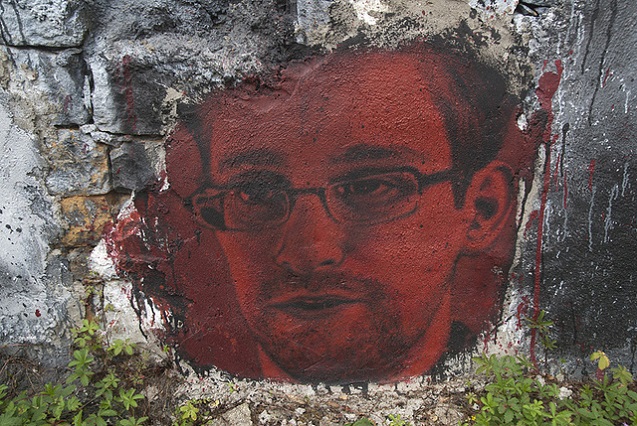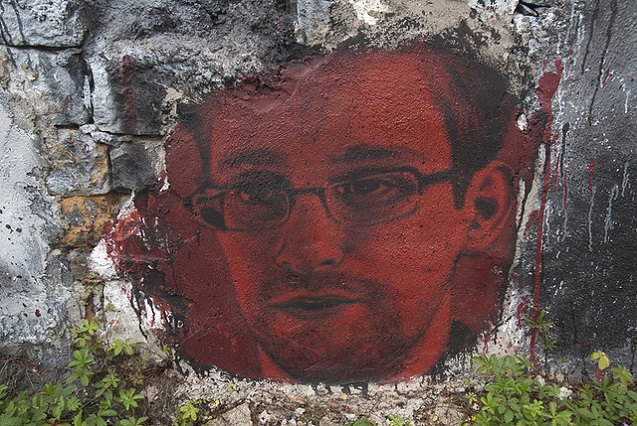
 thierry ehrmann / Flickr)” width=”637″ height=”426″ />Painted portrait of Edward Snowden. (Photo: thierry ehrmann / Flickr)
thierry ehrmann / Flickr)” width=”637″ height=”426″ />Painted portrait of Edward Snowden. (Photo: thierry ehrmann / Flickr)
On Friday, Venezuelan President Nicolas Maduro announced that Venezuela would offer political asylum to NSA whistle-blower Edward Snowden
Regardless of what happens next, President Maduro’s announcement was world-historical. With his announcement, Maduro has invited Americans to live in a new world: a “multi-polar” world in which the US government’s power is limited, not by a single “superpower adversary,” but by the actions of many independent countries that are not US adversaries; countries that agree with the US on some things and disagree with the US on other things, as is their right; countries that do not always accede to US demands, as is their right. The day after Snowden claims political asylum in Venezuela, the US and Venezuela will continue their robust economic trade; in particular, Venezuela will continue to be one of the top four suppliers of foreign oil to the United States.
It’s a general constant in human affairs that no one likes to be told that they have too much power for the general welfare. Nonetheless, we’re all capable, when we want, of seeing things from the other guy’s point of view.
And from the point of view of most people in the world, it’s not a good thing for the United States to have too much power in world affairs; from the point of view of most people in the world, it’s not a good thing for any one country to have too much power in world affairs.
The limiting of US power is no reason for Americans to panic: We’re going to be fine. The day after Snowden claims political asylum in Venezuela, we’ll still be responsible for a fifth of the world economy; we’ll still have an absurdly huge military; we’ll still have a veto on the UN Security Council. We’ll still be able to go to sleep peacefully in the knowledge that no one’s going to be invading or occupying us any time in any future that we can see – something that, unfortunately and unjustly, many people in the world still cannot do.
Obviously, the US government has a claim on Mr. Snowden. He was a US government employee, and as such, signed agreements about not disclosing classified information.
But it’s just as obvious that there are important, competing claims to the US government claim; and if these competing claims trump the US government claim on Mr. Snowden in this case, most Americans will be better off.
One important competing claim to the US government claim is the internationally-recognized right of political asylum. As Amnesty International noted last week: “The US authorities’ relentless campaign to hunt down and block whistleblower Edward Snowden’s attempts to seek asylum is deplorable and amounts to a gross violation of his human rights . . .”
Said Michael Bochenek, director of Law and Policy at Amnesty International, of Snowden, “It is his unassailable right, enshrined in international law, to claim asylum and this should not be impeded.”
Another important competing claim to the US government’s contention is the public interest in protecting whistle-blowers, especially national security whistle-blowers. As Human Rights Watch noted last week:
The law often criminalizes the disclosure of secrets by employees or agents of a government. But international law recognizes that revealing official secrets is sometimes justified in the public interest. In particular it may be necessary to expose and protect against serious human rights violations, including overreaching or unjustifiable surveillance. International principles on national security whistle-blowers outline various circumstances under which governments should protect people from punishment if they disclose information of public concern.
US whistle-blower protections fall far short of these standards for people who disclose abuse in the national security arena. US law simply does not provide national security whistle-blowers with adequate protection from retaliation or punishment for disclosures in the public interest.
Snowden, a former National Security Agency consultant, faces various charges in US federal court, some of which could carry lengthy prison sentences. These include charges under the antiquated US Espionage Act. The US government has interpreted this vague statute in ways that are inconsistent with international human rights law, providing no exceptions or adequate defenses for whistle-blowers who disclose matters of serious public import.
As Human Rights Watch suggested, the public interest in protecting whistle-blowers trumps the government interest in protecting state secrets in this case.
So, in acting to protect Snowden, Venezuela did most Americans a good service, and we Americans owe Venezuela a debt of gratitude, as Michael Moore noted.
But in the wake of Venezuela’s announcement, many people have a practical question: How could Snowden physically get from the Moscow airport to political asylum in Venezuela, given that, apparently acting on US instructions, Spain, France and Portugal blocked the plane of Bolivian President Evo Morales on suspicion that Snowden was on board?
This situation is something that a few hundred American peace activists could do something decisive about. You may have heard the word “flytilla” before. It comes from Palestine. It refers to efforts of international peace activists to challenge the Israeli government’s control over international travel to the West Bank, by flying in to Tel Aviv and publicly declaring that they intend to participate in solidarity activities with Palestinians in the West Bank living under Israeli occupation.
The word “flytilla” is of course derivative from the word “flotilla,” which has referred to efforts to break the Israeli-Egyptian blockade of Gaza by sailing into Gaza’s port from the Mediterranean in defiance of the blockade. Now, as you may know, there is a project called Gaza’s Ark to defy the blockade by sailing from Gaza’s port to the Mediterranean, carrying Palestinian goods for export, in defiance of the Israeli-Egyptian blockade on these goods.
A Snowden accompaniment flotilla of prominent and peace-loving Americans could assemble at the Moscow airport and fly together from Moscow to Caracas. Snowden could fly from Moscow to Caracas under the protection of our company, like the Fellowship of the Ring. If we fill the plane and pay for it, we can pick the plane’s flight path. Memo: the plane will not pass over Europe.
Of course, there remains the theoretical possibility that the US Air Force could try to force the plane down in international airspace.
But we have two protections against this.
One protection is that President Obama promised he was not going to be “scrambling jets to get a 29-year-old hacker.” And the other protection is the political protection of the presence of prominent Americans on board the plane. I voted for President Obama twice, gave him campaign money, made phone calls and knocked on doors in Indiana. Is President Obama going to shoot me down? I double dog dare him.
The participants in the flytilla could look like this. Many prominent Americans – backed by 26,000 other (mostly) Americans – signed a letter to Ecuador’s President Rafael Correa, urging him to grant Snowden’s request for political asylum. We wrote to President Correa because we thought that’s where Snowden was headed; if we had known that Venezuela would turn out to be the more likely destination, we would have written to President Maduro instead. I know personally many of the people who signed this letter, and I don’t doubt for a moment their willingness to follow words with deeds. In particular, Oliver Stone, Michael Moore, Naomi Klein, Noam Chomsky, Daniel Ellsberg, Tom Hayden and Danny Glover signed this letter. Maybe Uncle Noam and Grandpa Dan are getting a little long in the tooth for international travel adventures. But Oliver, Michael, Naomi, Tom and Danny are traveling the world all the time. (Some pedant will say: But Naomi is Canadian! Whatever! Her parents are American; that’s close enough.)
If you would like to ride in the Snowden accompaniment flytilla, please note it in the comments. And please note any special gifts you have to offer, like owning a plane or being licensed to fly one.
We’re not backing down in the face of Trump’s threats.
As Donald Trump is inaugurated a second time, independent media organizations are faced with urgent mandates: Tell the truth more loudly than ever before. Do that work even as our standard modes of distribution (such as social media platforms) are being manipulated and curtailed by forces of fascist repression and ruthless capitalism. Do that work even as journalism and journalists face targeted attacks, including from the government itself. And do that work in community, never forgetting that we’re not shouting into a faceless void – we’re reaching out to real people amid a life-threatening political climate.
Our task is formidable, and it requires us to ground ourselves in our principles, remind ourselves of our utility, dig in and commit.
As a dizzying number of corporate news organizations – either through need or greed – rush to implement new ways to further monetize their content, and others acquiesce to Trump’s wishes, now is a time for movement media-makers to double down on community-first models.
At Truthout, we are reaffirming our commitments on this front: We won’t run ads or have a paywall because we believe that everyone should have access to information, and that access should exist without barriers and free of distractions from craven corporate interests. We recognize the implications for democracy when information-seekers click a link only to find the article trapped behind a paywall or buried on a page with dozens of invasive ads. The laws of capitalism dictate an unending increase in monetization, and much of the media simply follows those laws. Truthout and many of our peers are dedicating ourselves to following other paths – a commitment which feels vital in a moment when corporations are evermore overtly embedded in government.
Over 80 percent of Truthout‘s funding comes from small individual donations from our community of readers, and the remaining 20 percent comes from a handful of social justice-oriented foundations. Over a third of our total budget is supported by recurring monthly donors, many of whom give because they want to help us keep Truthout barrier-free for everyone.
You can help by giving today. Whether you can make a small monthly donation or a larger gift, Truthout only works with your support.